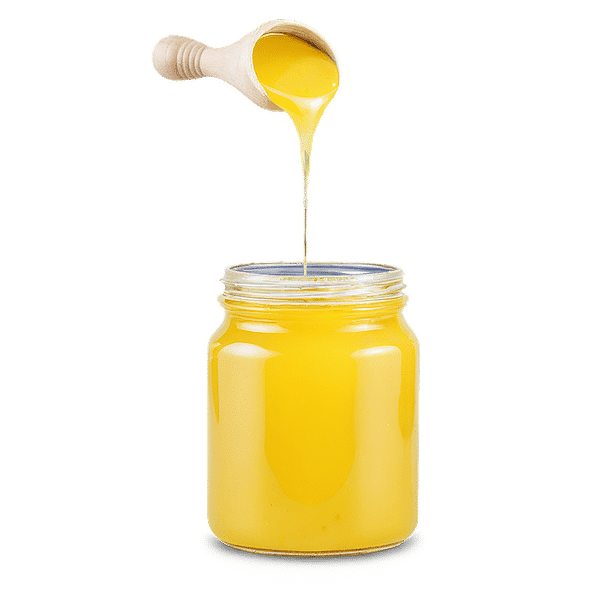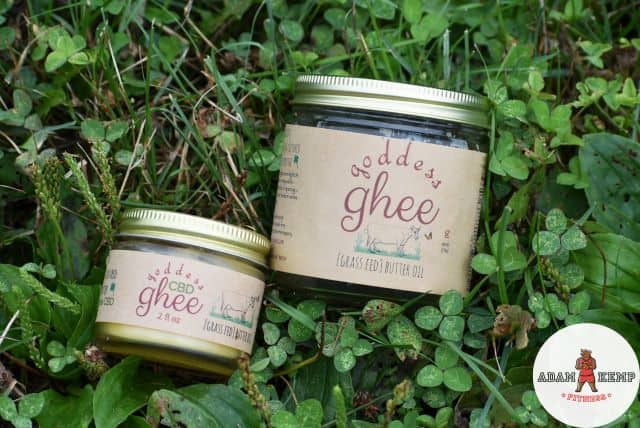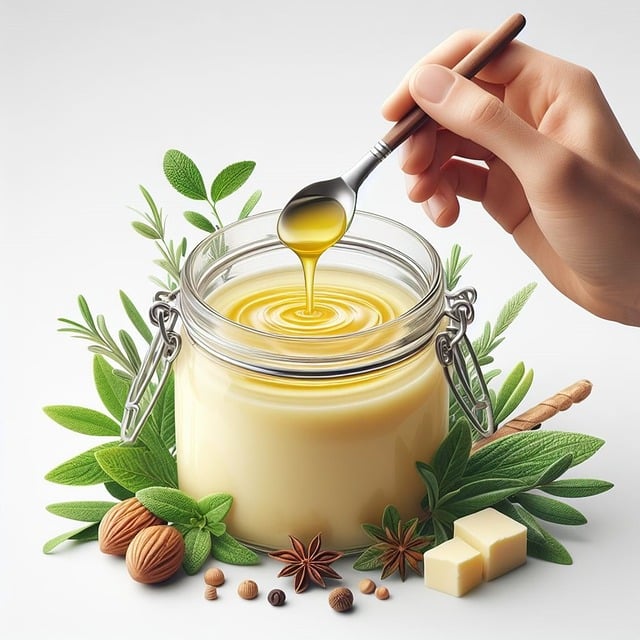What is Ghee & Is Ghee Dairy Free or Vegan?
Ghee is a clarified butter that originates from Ayurvedic traditions, created by simmering butter to remove water and separate the milk solids.
This process results in a product that is essentially “butter oil,” rich in beneficial fats and devoid of moisture and milk proteins.
According to Ayurveda, ghee is considered the healthiest source of edible fat due to its high concentration of essential nutrients and fat-soluble vitamins, such as Vitamin A, E, and K.
Ghee also has a higher smoke point compared to butter and many other oils, making it safer for cooking at high temperatures and reducing the risk of oxidizing fats, which can create harmful free radicals.
What is Ghee?
As mentioned before, ghee is a type of clarified butter that has its roots in traditional Ayurvedic medicine. It is made by simmering butter until the water evaporates and the milk solids separate, leaving behind pure butterfat.
This process results in a rich, nutty-flavored oil that is highly valued for its culinary and medicinal properties.
Is Ghee Dairy Free?
One of the key benefits of ghee is that it does not contain lactose or casein, the primary components that make traditional dairy products problematic for those with lactose intolerance or dairy sensitivities.
The process of making ghee removes these elements, making it a suitable alternative for those who avoid dairy.
Is Ghee Vegan?
Ghee is not vegan. Although the process of making ghee removes lactose and casein, it is still derived from butter, a product of animal origin.
Therefore, ghee does not align with vegan dietary principles, which exclude all animal products.
Vegans typically seek plant-based alternatives such as coconut oil, avocado oil, or vegan butter substitutes to achieve similar cooking properties and flavors without using animal-derived ingredients.
Benefits of Ghee vs Butter

Ghee offers several health advantages over traditional butter:
- Higher Smoke Point: Ghee can withstand higher cooking temperatures without burning, which helps preserve its nutritional content and flavor.
- Lactose and Casein Free: Ideal for individuals with dairy sensitivities or lactose intolerance.
- Rich in Nutrients: Ghee contains fat-soluble vitamins and Conjugated Linoleic Acid (CLA), which is beneficial for weight management and overall health.
- Enhanced Flavor: The process of making ghee from high-quality, grass-fed butter enhances its taste and nutritional profile.
Switching from butter to ghee can be an effortless way to enhance your diet and overall health, providing you with a nutrient-rich, dairy-free alternative that is both delicious and beneficial.
Culinary and Health Uses

Ghee’s unique properties and health benefits have made it a staple in many diets, particularly in Indian and Ayurvedic cooking.
Its rich, nutty flavor enhances a variety of dishes, from savory to sweet, making it a versatile addition to the kitchen.
The high smoke point of ghee, which is higher than that of butter or many oils, means it can be used for frying, sautéing, and roasting without breaking down into harmful compounds.
My wife Anna, originally from Kazakhstan, uses ghee for cooking all the time.
In her country, ghee is a common cooking fat, prized for its taste and health benefits.
Since introducing me to ghee, we have replaced butter and other oils with ghee in many of our meals.
Anna’s traditional recipes often call for ghee, and we find that it not only makes the dishes taste better but also contributes to a healthier diet.
One of the main reasons we favor ghee is its health benefits.
Ghee is known to improve digestion, thanks to the butyrate it contains, which supports gut health and reduces inflammation.
Its anti-inflammatory properties make it a valuable ingredient for maintaining overall wellness. Additionally, ghee is rich in fat-soluble vitamins A, E, and K and contains Conjugated Linoleic Acid (CLA), which is beneficial for weight management and metabolic health.
We particularly enjoy using ghee for high-heat cooking because it doesn’t oxidize as quickly as other fats.
This means we can achieve the perfect sear on meats and vegetables without worrying about producing harmful free radicals.
Ghee also lends a delightful flavor to baked goods and can be used in place of butter in almost any recipe, giving a unique and rich taste that butter or other oils cannot match.
Incorporating ghee into our diet has been a simple yet effective way to boost the nutritional value of our meals while enjoying the culinary richness it adds.
Whether we are cooking traditional dishes or experimenting with new recipes, ghee has become an indispensable part of our kitchen repertoire!
This website does not provide medical advice. This website site does contain affiliate links, and purchases may earn a commission.
Read my Medical Disclaimer, Review Disclaimer, and Publishing Policies for more details. Use of this site indicates acceptance of these terms.



